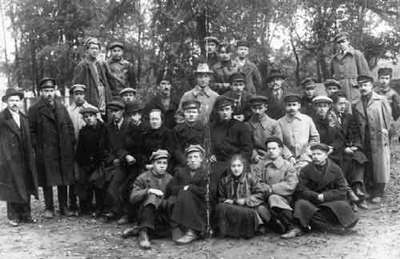In June 1922, five years on from the Russian
revolution, a group of Moscow communists
gathered to discuss a letter by Vladimir
Petrzhek, an auto worker, tendering his
resignation from the communist (or
Bolshevik) party.
Petrzhek was one of the worker
communists who swelled the party’s ranks
during the civil war of 1918-19, when the
communist “Reds” had defended the
revolution from the western-supported
“White” generals.
Petrzhek’s wife had died suddenly in
1918, leaving him as a single parent. He had
volunteered to fight the Whites anyway, and
joined the party at the front in April 1919.
Within a year, the main White armies
had been beaten and the huge Red army was
able to start demobilising. The communists’
efforts shifted to the task of rebuilding
Russia’s economy, shattered by seven years
of war and civil war.
Workers returned from the front to their
factories: in Petrzhek’s case, the AMO auto
works (later renamed ZiL) in south east
Moscow. In early 1921 the economic policies
adopted during the civil war, based on
nationalisation and state compulsion, were
replaced by the New Economic Policy (NEP),
which we might today call “mixed economy”.
One result of NEP was the reappearance
of entrepreneurs and traders, some of whom
got rich very quickly and very visibly. Wealth
also accumulated among the Bolshevik party
“tops” – firstly, but not exclusively, in the
state trusts that owned the factories. Vladimir
Petrzhek told his comrades that he was
quitting not because of inequality in society as
a whole – which, he agreed with them, was to
some extent inevitable – but because of
inequality among communists. A party that
tolerated that could never bring about social
change, he argued.
“What is communism?”, he asked in his
resignation letter. Russia’s poverty made
impossible the implementation of egalitarian
principles in society as a whole, but members
of a truly communist party could and should
strive for equality among themselves.
“In the communist party [Petrzhek] had
hoped to find the realization of his dream of
communism. But he did not find communism.
He learned only that among communists there
were strongly-developed private proprietorial
instincts,” the minute-taker recorded.
Local party leaders replied that
objective circumstances were to blame, and
urged Petrzhek to be patient. He responded
that “he was not disillusioned with the idea of
communism itself – he understood that
communism was in general a long way off –
but for him the lack of solidarity and equality
among communists themselves was too hard
to bear”.
I came across these minutes more than
three-quarters of a century later in a Moscow
archive. I was researching a book, published
this year,* on the revolution’s retreat, or
reversal, in the early 1920s.
What the communists cared about
Petrzhek was by no means the only
communist disturbed by inequality in the
party. In the summer of 1920, when the rankand-
file communists who had rallied to the
party during the civil war were streaming
back from the front, the issue of inequality –
“the ranks and tops” debate, as it was called –
was at the centre of a big political crisis.
The civil-war recruits, who
outnumbered Bolsheviks who joined the party
before 1917 by five to one, were not just
talking about material inequality.
As the
Bolshevik leader Grigorii Zinoviev told a
special party conference in September 1920,
the “ranks and tops” debate also concerned
political power: the accumulation of it in....

